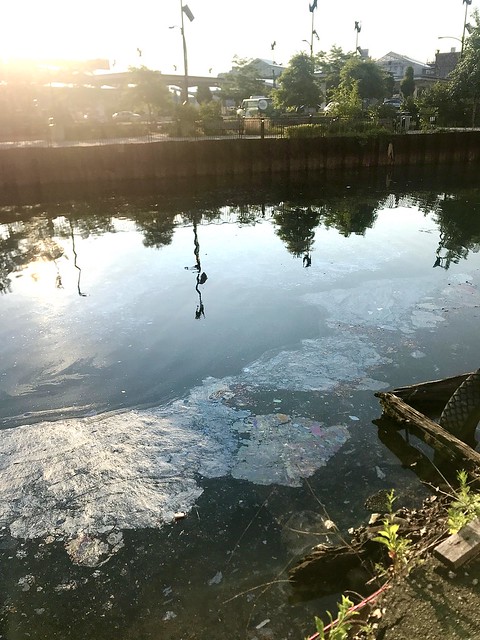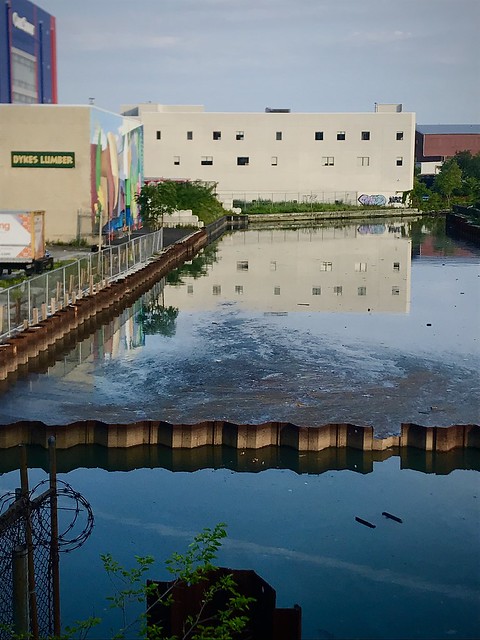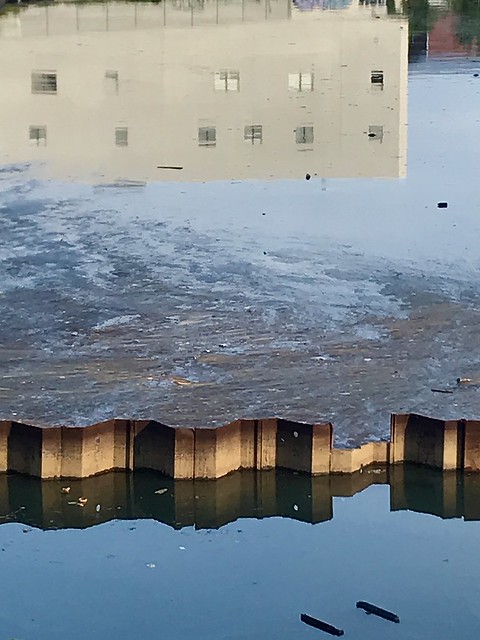The Gowanus Canal's 4th Street Basin near Whole Foods earlier this year
Coal Tar sheen clearly visible on the surface of the water at Gowanus' 4th Street Basin
Looking Towards Whole Food's parking lot
CSO and Coal tar visible from Third Avenue, looking at the 4th Street Basin
From Whole Food's Esplanade.
The Environmental Protection Agency was immediately notified of today's condition.
The sight is heartbreaking. Why? Because the 4th Street Turning Basin was the first portion of the canal to be cleaned and capped as part of the EPA's Superfund remediation of the polluted canal. The basin had been chosen for a Dredging and Capping Pilot Study, the results of which informed and helped EPA fine-tune different techniques that will be applied to the entire canal.
E.P.A.'s plans to begin the dredging of the main canal sometime in late 2020.
The pilot study was completed in late 2018 and represented a huge milestone. The work consisted of dredging the contaminated sediment at the bottom of the basin and capping it to prevent recontamination. It was the first time in over 100 years that a section of the Gowanus was clean of debris and toxic 'black mayonnaise', the thick coal tar sediment at the bottom of the canal, which is a result of heavy industrial use in and around the Gowanus over centuries.
This is why the sight of new coal tar and CSO floating on this remediated section this morning is so upsetting. The pollution was flowing into the Basin from the main canal. Perhaps Wednesday's heavy rains are to blame for the current conditions?
This illustrates the complexity of remediating such a polluted body of water . It also demonstrates the fragility of the environment after decades of abuse.
Surely, the sight of little ducklings swimming around on the polluted water in Vogel's video above is just so sad.









If it truly is capped, some surface issues aren't really a problem. Once there is flow again, not an issue.
ReplyDeleteIt is flow that brought it into the basin. Some of it will surely settle on the new cap.
DeleteEPA takes decontamination and protection of their remedy very seriously.
And can you imagine the amount of CSO on the entire surface of the canal currently?
This is sickening truly. The CSO's no doubt contains the COVID 19 virus as well as many other known pollutants and toxins. Is it really okay for us to say a little gonorrhea is ok? The bacteria count in the air must be sky high as this was already scientifically confirmed. And that is without even mentiong the coal tar is a carcinogen! Why would any sane person dismiss the surface and its health hazards? Unconscionable. Ignoring science kills! havent we learned this already? We are looking at a envronmental disaster: a superfund site with enormous ramifications. Shall we wait til it implodes like the gym? Is this really just another "little bulge" in a wall? Hasn't this community had enough already? The public ought to be warned with clear and large signs! Especially anyone new to the area. Science is not to be tampered with unless we truly desire all the predicatable bad consequences that come with it. Aren't we awake yet? Science Rocks! Isn't that what we teach our kids?
ReplyDeleteRecent rains have made the canal quite smelly all around. The heat makes it more oppressive.
ReplyDeleteThe DEP feels entitled to dump sewage during rain storms. The state gives them a "pass" on releasing pollution and bacteria when it is raining, as if God is responsible for the CSA.
And then we have the DCP rezoning under deBlasio and Lander that will permit additional residential zoning that promotes the addition of 18,000 new humans living along this canal.
Climate models continue to confirm we are moving to a period of much more intense rain storms over Gowanus. So get ready for a more constant state of bacteria filled smelly air around Gowanus.
It leaves one wondering if the world might one day soon be looking to Gowanus as the source point where the next major pandemic erupted out of.
I totally agree with you.
DeleteBUT WILL IT CURE MY DANDRUFF?
ReplyDeleteuhhh where does the coal tar come from though-
ReplyDeleteFrom the former Gas Manufacturing Sites that used to be there. Coal tar is the waste product of that process.
Delete